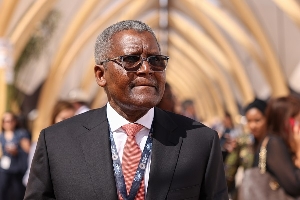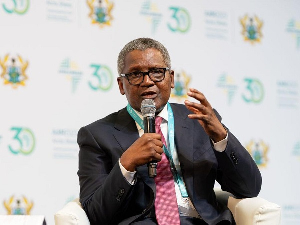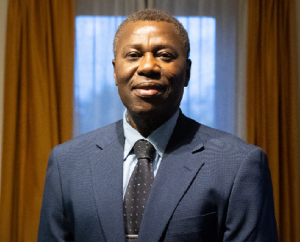Fumesua (Ashanti Region), 6 Jan. '99,
The Timber Export Development Board (TEDB) and the Forest Products Inspection Bureau (FPIB) have presented a cheque for an initial 50 million cedis to the Forestry Research Institute, Ghana (FORIG) to support plantation development research. The money is in fulfilment of a pledge of 200 million cedis the two organisations made to support plantation development research at FORIG under the Forestry Development Master Plan (FDMP). The plan seeks to increase the area of forest and tree cover by 10 per cent through afforestation, re-forestation, industrial plantations and agro-forestry. Under the plan, FORIG has been tasked to provide about 500,000 seedlings of fast-growing species of Wawa, Cedrella and Ceiba. It is expected that other species like Kusia, Dahoma, Niangon, Odum and Bamboo will be added in the course of time. Presenting the cheque, Mr John A. Sagoe, Ashanti and Brong Ahafo Area Manager of the TEDB, said the two organisations attach great importance to the venture since it is the beginning of a major project to commercialise tree growing in the country and to improve the environment. Mr Sagoe said the successful implementation of the initial venture will determine the rate of cash flow from TEDB and FPIB and hoped FORIG will receive the necessary assistance to ensure total success. Dr Joseph R. Cobbinah, Acting Director of FORIG, who received the cheque, expressed the appreciation of the Institute to the two organisations for the support. Dr Cobbinah noted that the country's forest has dwindled from 8.2 million hectares at the beginning of this century to a mere two million hectares now. The mean annual rate of deforestation, is estimated at between 0.84 and 1.3 percent, which is high even for the humid tropics. He said the use of tree plantations is, therefore, widely advocated as a remedial measure to reforest degraded land. Although it is estimated that the area under plantation in Ghana is about 75,000 hectares, recent studies indicated that only 15,000 hectares are productive. It is now estimated, Dr Cobbinah said, that over 200,000 hectares of tree plantations are needed in order to make up for the nation's deficit and assured that FORIG will apply the funds for the purpose for which it was given. GRi
General News of Thursday, 7 January 1999
Source: --












